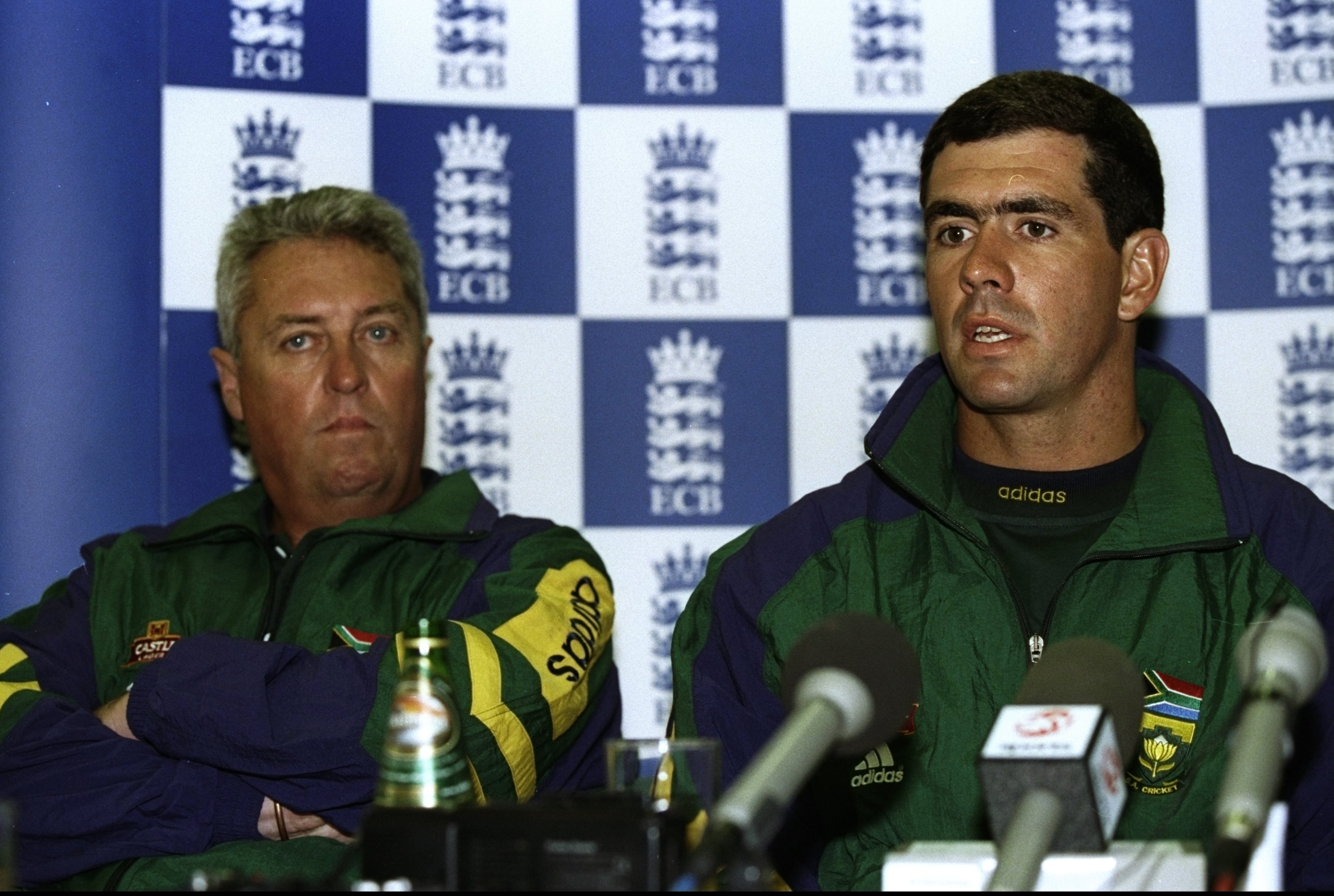Azhar, Amir, Cronje feature in 10 match-fixing incidents which shook the world

As Pakistan take the field against England in the first Test on Thursday, all eyes will be on Mohammad Amir, and all ears will be on the Lord's crowd. Much has been said about the return of the supremely talented pacer to the ground where he brought the game into disrepute. However, sadly, he was not the first one to do so, and considering how money is flowing into the game, almost unregulated, it will not be the last as well. As much as the romantics in us would want to believe, the game has developed a shady underbelly, and it is here to stay.
Here are the ten of the biggest match-fixing/ spot-fixing incidents, which shook the foundation of the game.
1. Hansie Cronje

 ©
© On January 2000, Hansie Cronje became the only Test captain to forfeit an innings voluntarily during a rain-washed game against England. South Africa had already won the Test series, and the fifth was a dead rubber. After the home side made 155/6 on the first day, rain washed away the next three days of the Test. In a valiant attempt, Cronje declared South Africa's innings at 248/8 and reached an agreement with Nasser Hussain, who declared England's first innings at 0/0. Cronje forfeited South Africa's second innings and England were left with a target of 249 to chase down in order to win the game. The visitors reached the target with two wickets in hand, and while some criticized Cronje for setting such a low total, others applauded his bravery. However, any amount of romance that was associated with this match disappeared a few months later, when it emerged that Cronje was approached by a bookmaker to ensure that the match ended with a positive result.
"I was not honest and apologise unreservedly," were the words which shook the world in 2000.
The former South African skipper was one of the most respected cricketers in the world at that time, such was his reputation that people were more willing to question the Delhi Police's investigation, rather than Cronje's integrity. The police released a tape containing the conversation between Cronje and Indian bookie Sanjay Chawla, where both Herschelle Gibbs, who later claimed that Cronje had offered him $15,000 to score less than 20 runs in an ODI against India, and Nicky Boje were also mentioned. Cronje, eventually, admitted his crime and was banned for life.
2. Mohammad Azharuddin

 ©
© Cronje's apprehension started the dominoes falling. The South African also spilled the beans on three other cricketers, Mohammad Azharuddin, Ajay Jadeja, and Saleem Malik. It was the former Indian skipper who had introduced Cronje to the bookies and soon the Indian income tax officials raided his house. After initial denial, Azharuddin confessed to fixing games with the help of his colleagues Ajay Jadeja and Nayan Mongia. Azhar was banned for life by the BCCI, which was overturned by a court in 2012, while Jadeja was banned for 5 years, which was overturned in 2003. Meanwhile, across the border Saleem Malik and Ata-ur-Rehman were also found guilty of fixing matches, and were banned for life.
Cricket had plunged into a state of crisis at that time, as the gentleman's game had suddenly stumbled upon its dark belly, which it had preferred to ignore for a long time. A lot of famous cricketers were implicated by the ones who were exposed, as the game was laid bare of its integrity. Stalwarts like Wasim Akram and Mushtaq Ahmed were questioned, while bookmaker MK Gupta claimed that players like Brian Lara, Dean Jones, Alec Stewart, Arjuna Ranatunga, Aravinda da Silva, and Martin Crowe were also involved in match-fixing. Cricket, as we knew it, was never the same again.
3. Manoj Prabhakar
1996 was the year when Indian cricket was first dragged into the mud, when former team manager Sunil Dev claimed that a lot of Indian cricketers were involved in match-fixing and asked for an enquiry. One year later, Manoj Prabhakar alleged that a teammate had offered him Rs.25 lakhs to lose a match against Sri Lanka in 1994. The BCCI did appoint a commission, however, Prabhakar's allegation later boomeranged back to him, and the all-rounder was banned for five years. Prabhakar was just the tip of the iceberg, the rest followed soon.
4. Saleem Malik
Saleem Malik and medium pacer Ata-ur-Rehman was found guilty of match-fixing in May 2000. The duo were handed over life bans, along with a £12,500 fine for Malik. Then Pakistan captain Wasim Akram and Mushtaq Ahmed were fined for failing to co-operate with the investigation, along with Waqar Younis, Inzamam-ul-Haq, Akram Raza and Saeed Anwar. The judge also recommended that Akram and Mushtaq Ahmed should never lead the side, as Pakistan cricket, much like their neighbors, was left reeling from the after-effects.
5. Salman Butt, Mohammad Amir, Mohammad Asif

 ©
© Also read, Why Mohammad Amir deserves a second chance
Just when the game was recovering from all the scandals at the start of the new millennium, it stumbled onto a new skeleton in the closet. Three young and talented Pakistani cricketers were accused of spot-fixing in a Test match against England at Lord's.
A sting operation by English newspaper News of the World, where an undercover reporter bribed the trio to ball no-balls at specific points of the match, put the Scotland Yard on notice. Eventually, Salman Butt, Mohammad Asif, and the prodigiously talented Mohammad Amir were suspended, for 10 years, 7 years, and 5 years respectively, from International cricket.
6. S Sreesanth

 ©
© Soon after Amir saga in England, the Indian Premier League showed that spot-fixing is much deeply rooted evil in the sport. Another sting operation, and few more cans of worm were opened up. It took some time for the authorities to crack down on the issue, but, eventually, in 2013 Sreesanth, Ankeet Chavan, and Ajit Chandila were arrested for spot-fixing charges. Sreesanth, who was playing for Rajasthan Royals, was alleged to have given away 14 runs as per plan in a match against the Kings XI Punjab, and a week later, he was arrested for accepting money from bookmakers for underperforming in that game. The image of BCCI flagship was tainted forever, as investigation confirmed what was feared by a host of fans since the tournament started. However, in 2015 the trial court dropped the charges against Sreesanth, Ankeet Chavan, and Ajit Chandila, who had been charge-sheeted by the Delhi Police for the IPL 2013 corruption scandal.
Also, read : Sachin playing for Pakistan and 4 other cricket facts you might not know
7. Mark Waugh and Shane Warne
This was one of the first recorded instances of bookmakers influencing the game, and how the authorities have always been keen to sweep these incidents under the carpet. In 1994-95 Mark Waugh and Shane Warne received money from “John the bookmaker” in return for information regarding pitch and weather ahead of the match. However, the biggest surprise was the Australian Cricket Board's stance to cover up this issue, and failing to report the incident until four years after it had happened.
8. Lou Vincent
"My name is Lou Vincent and I am a cheat," read the former Kiwi cricketer's statement released on July 2014.
Lou Vincent was initially banned for failing to report an approach from a bookie during a Bangladesh Premier League match, before the ECB banned him for fixing matches in the county cricket. Vincent was charged with 14 different offenses. The 37-year-old, eventually, accepted those charges, and refused to blame his struggle with clinical depression for his actions.
"I have shamed my country. I have shamed my sport. I have shamed those close to me. For that, I am not proud. I lost faith in myself and the game. I abused the game I love. I had to put things right. Speaking out. Exposing the truth. Laying bare the things I have done wrong is the only way I can find to begin to put things right," he said.
9. Mohammad Ashraful
Mohammad Ashraful is one of the most talented cricketers Bangladesh has produced in their cricketing history, however, his career has ended as a cautionary tale for what talent without proper guidance can end up being. The former swashbuckling batsman was charged with four accounts of fixing in the 2013 season of the Bangladesh Premier League, before being handed over an eight-year ban. His ban was later reduced to five years.
10. Danish Kaneria

 ©
© Former chief of International Cricket Council's anti-corruption unit Lord Condon disclosed how deeply the malady of corruption and fixing were rooted in the county cricket in England. "It has been suggested to me that the seeds of corruption in cricket were sown in the 1970s when county and club games in domestic tournaments in England and other countries were allegedly fixed by teams to secure points and league positions," Condon was quoted as saying by the Daily Mail back then.
While initially the report was treated with a lot of skepticism, investigation in 2010 unraveled what the ECB did not want to see. Mervyn Westfield, former Essex cricketer, was arrested and sentenced to prison for four months for spot-fixing in a match. His teammate Danish Kaneria, the talented Pakistani spinner, was also found guilty by a disciplinary panel. Kaneria, as it turned out, had induced Mervyn to underperform in a game, and was guilty of match-fixing. The PCB accepted the lifetime ban handed out by the English board, and another promising career came to an early end.

Comments
Sign up or log in to your account to leave comments and reactions
0 Comments